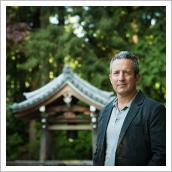By Whitney Hale, Alexis Simms
 (Nov. 18, 2015) — The next Distinguished Scholar Lecture presented by University of Kentucky Confucius Institute will examine the spiritual state of wu-wei (effortless action). "Trying Not to Try: Cooperation, Trust and the Paradox of Spontaneity," to be delivered by Canadian researcher and scholar Edward Slingerland, will begin at 10 a.m. Thursday, Nov. 19, at the Niles Gallery located in the Lucille C. Little Fine Arts Library and Learning Center. The lecture/discussion, and a reception scheduled for 11:30 a.m., are free and open to the public.
(Nov. 18, 2015) — The next Distinguished Scholar Lecture presented by University of Kentucky Confucius Institute will examine the spiritual state of wu-wei (effortless action). "Trying Not to Try: Cooperation, Trust and the Paradox of Spontaneity," to be delivered by Canadian researcher and scholar Edward Slingerland, will begin at 10 a.m. Thursday, Nov. 19, at the Niles Gallery located in the Lucille C. Little Fine Arts Library and Learning Center. The lecture/discussion, and a reception scheduled for 11:30 a.m., are free and open to the public.
Many early Chinese thinkers had as their spiritual ideal the state of wu-wei, or effortless action. By advocating spontaneity as an explicit moral and religious goal, they inevitably involved themselves in the paradox of wu-wei — the problem of how one can try not to try — which later became one of the central tensions in East Asian religious thought. In "Trying Not to Try," Edward Slingerland will look at the paradox from both an early Chinese and a contemporary perspective, drawing upon work in social psychology, cognitive neuroscience, and evolutionary theory to argue that this paradox is a real one, and is moreover intimately tied up with problems surrounding cooperation in large-scale societies and concerns about moral hypocrisy.
"Dr. Slingerland is not only an expert in Warring States (5th-3rd c. B.C.E.) Chinese thought. He also speaks to scholars of religion, psychology, philosophy and really anyone interested in life at the intersection of the sciences and humanities. This talk is for everyone, and truly not to be missed," said Will Gervais, assistant professor of psychology at UK College of Arts and Sciences.
Edward Slingerland is the Canadian Research Chair in Chinese Thought and Embodied Cognition at the University of British Columbia. His research specialties and teaching interests also include religious studies, cognitive linguistics, ethics, the relationship between the humanities and the natural sciences, and the classical Chinese language.
In 2014, Slingerland finished a trade book, "Trying not to try: The Art and Science of Spontaneity," which was released to much critical acclaim by Crown (Random House). His current primary work in progress is an academic monograph with the working title "Body and Mind in Early China: Beyond the Myth of Holism," an article-length version which was recently published in the Journal of the American Academy of Religion. Other recent publications include "Creating Consilience: Integrating the Sciences and the Humanities" (co-edited by Mark Collard), a statement on the importance of a “second wave” of science-humanities cooperation; articles including a qualitative coding analysis of ancient Chinese texts published in Cognitive Science; a response to the situationist critique of virtue ethics published in Ethics; and the article "Metaphor and Meaning in Early China," which was recently awarded the 2012 Annual Best Essay award from the journal Dao. Previous works also include well-received translations of the "Analects of Confucius" and numerous peer reviewed articles.
From the concept of yinyang to the theory of wu-wei, UK Confucius Institute has provided a wealth of lectures on the UK campus in recent years. "We are very thrilled to see that a great range of subjects related to China studies are being explored through the Confucius Institute’s Distinguished Scholars Series. This has been our fourth year with the series and it has been a great way to bring to UK great scholars in areas related to China. The institute will be calling for nominations for speakers for the 2016 calendar year’s Distinguished Scholars Series in late November, and I would like to encourage interested faculty to put in their nominations," said Huajing Maske, director of the UK Confucius Institute and executive director of the Office of China Initiatives.
A gateway for Chinese language, culture and art to the people of Kentucky, UK Confucius Institute provides leadership, support and coordination for Chinese language and programs in K-12 schools as well as on UK's campus; assists and facilitates establishing and maintaining faculty and student exchanges between UK colleges and Chinese universities; conducts Chinese language and cultural exchange; and promotes education about China on campus, across the Bluegrass region, and throughout the Commonwealth.
For more information, visit UK Confucius Institute online at www.uky.edu/international/confucius_institute. Connect with the institute on social media at facebook.com/UKconfucius on Facebook, @UKConfucius on Twitter, and at "ukconfucius" on Snapchat.
